QLD crime crisis: One couple’s tale exposes the nightmare behind the statistics
They are just two of almost 300,000 victims of crime in Queensland each year. But behind that statistic lies devastating stories of terror and loss – and this couple’s experience is one of the most remarkable.
Gold Coast
Don't miss out on the headlines from Gold Coast. Followed categories will be added to My News.
A couple who moved to the Gold Coast from Sydney just two years ago have found themselves victims of the twin crises gripping Queensland – youth crime and the chaos on our roads.
In the space of just three months, David and Elle have had their lives turned upside down, first by a car crash that almost claimed Elle’s life, and then when David’s car was attacked by youths wielding axes in the car park of one of the Gold Coast’s biggest shopping centres.
The driver of the car that smashed into Elle’s vehicle is facing serious charges.
The juveniles who smashed David’s car have yet to be found.
The shocked couple, meant to be enjoying one of the best years of their lives after getting married in February, instead find themselves dealing with Elle’s serious injuries, out of pocket by thousands, and in fear of what may happen next – the reason they asked we don’t publish their surnames.
They are just two of the tens of thousands of Queenslanders who have become victims of crime. Two more to add to the 289,657 who were victims last year – the highest such number in Australia.
This is their story.
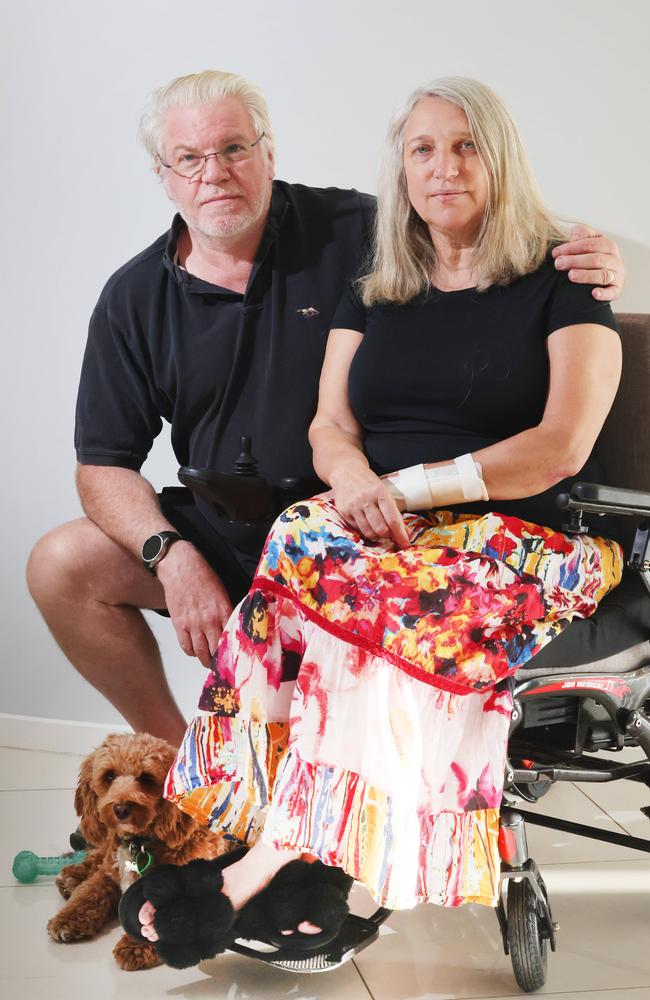
A MOMENT THAT CHANGED EVERYTHING
It was 7am on a bright April morning when Elle’s life was changed in an instant
She was driving to work along Creek Rd in Pimpama – a road she drove to avoid the daily chaos on the M1.
But the chaos came to her anyway.
“Never in a million years would I have dreamt I would ever be in a car accident on that road. It’s so quiet in the mornings,” Elle recalls.
“There was a scooter in front of me, I went around him, literally looked up and next second I could see a big four wheel drive cross from his lane into mine and hit me head on.”
Elle’s BMW 640 was hit at high speed by a Ford Ranger, the car shoved into bush by the roadside by the force of the accident.
Elle survived, but only just, with the car’s safety features and the quick action of a passing nurse combining to save her life.
“It saved my life that car. The cockpit did not crumple, did not move. The whole rest of the car crumpled,” she says.
“But also the thing that saved me was the fact that the first person on site, within minutes of the accident happening, was a nurse. I had some very severe injuries, I had broken arteries, I was bleeding out, and she tourniqueted me. It saved my life, because the ambulance did not turn up for another few minutes. I would have bled out by then.
“I was just very lucky.”
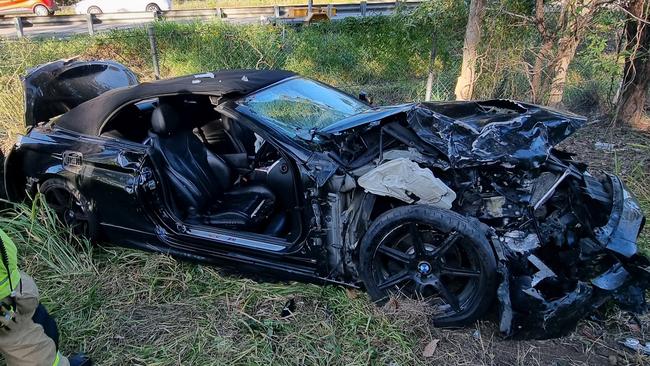
Elle slipped in and out of consciousness as emergency services worked to save her.
She remembers small fragments – the bones sticking out of her wrist, her severed finger hanging by a piece of skin, the firefighters cutting her from her vehicle.
She was rushed to hospital by Queensland Ambulance Service crews, where the emergency team swung quickly into action.
“It was like something out of a movie,” says David, who had joined his wife after being alerted to what happened. “As soon as she walked in people just descended.
“You see the movies and you think, that can’t be real, but it is.
“There was at least four surgeons attending very quickly and then all the support people, and we just got shoved to the back, another friend and some other family – you get over there.
And they just got into it.
“From being in the hospital to going into surgery was less than an hour.”
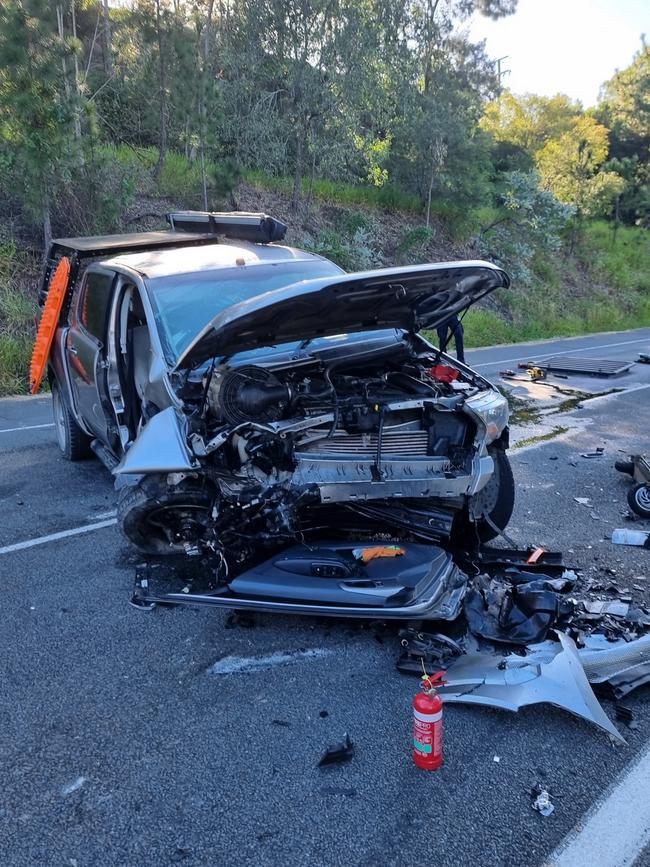
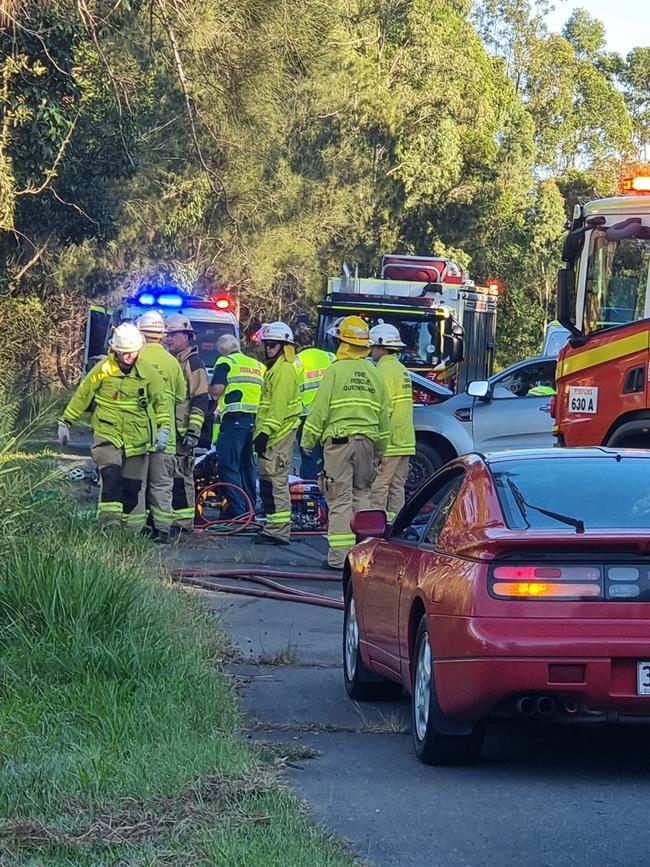
It was to be the first of many surgeries. Surgeries that filled her with titanium and pins.
Elle had bleeding on the brain, a broken clavicle, broken sternum, compound fracture in her left wrist, several fractures in her spine, a fracture in her left knee, two breaks in her ankle.
She spent five weeks in hospital – beating the forecasts of doctors who said she may be there for three months – but has a long road ahead to make a full recovery.
The alleged driver of the Ford Ranger, meanwhile, faces fallout of a different nature from the incident – accused by police of dangerous driving causing grievous bodily harm and driving with drugs in his system.
“Following an investigation, police will allege the driver of the Ford Ranger was travelling southbound on Creek Street at Pimpama, while negotiating an open left curve,” police told the Bulletin.
“The driver has for unknown reasons failed to negotiate the curve and has crossed onto the opposing northbound lane resulting in the collision.
“A 35-year-old Marsden man has been charged with Drive without due care and attention or Drive without reasonable consideration for other persons using road or place Causes death or grievous bodily harm and offence of driving etc. while relevant drug is present in blood or saliva.
“He is due to appear in Southport Magistrates Court on September 16.”
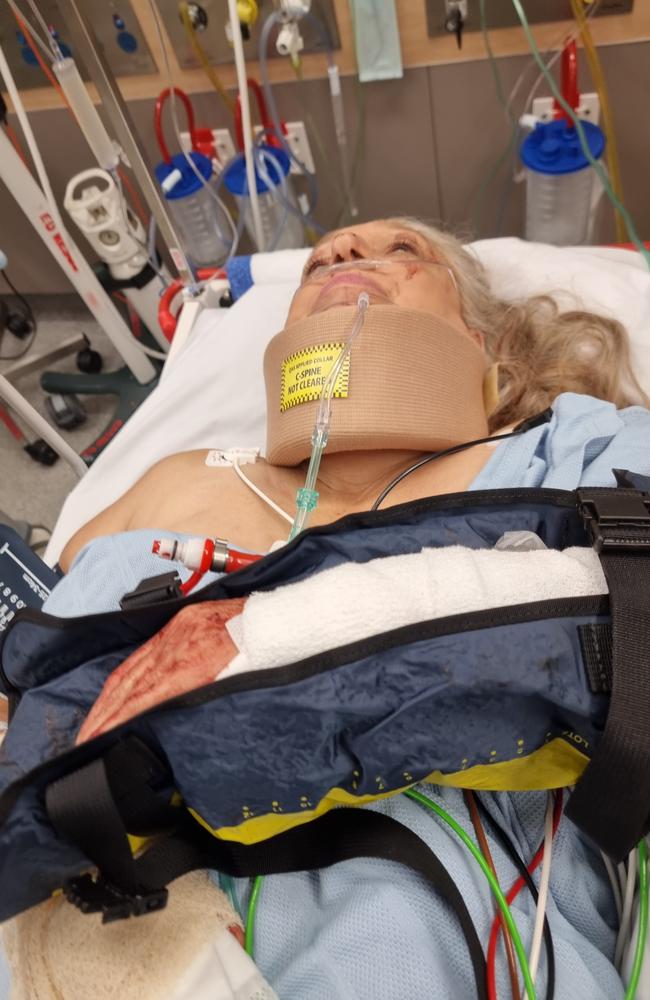
THREE MONTHS LATER – AND THEY’RE HIT AGAIN
Part of the reason David and Elle moved from Sydney was to help care for David’s elderly parents.
On the afternoon of Monday July 15, almost exactly three months after the crash that nearly killed Elle, David brought his 97-year-old father to an appointment at a hearing clinic at Westfield Helensvale.
As they left the centre, he immediately noticed that something was amiss.
“I’m walking towards the car and there are all these big burly security guards at my car.
I thought, I know I’m in a 60-minute car park but I’m sure we haven’t been more than 60 minutes, I’m sure they’re not going to have a go at me when I’ve got my elderly dad in a wheelchair. And there was no handicapped parking available.
“I get closer and they say, ‘Is this your car?’. And I go, ‘here we go, now what?’ And they go, ‘oh, it’s been attacked’. ‘What do you mean it’s been attacked’, and he said, ‘have a look’.”
The window on the passenger side of David’s car, a high-end Range Rover, had been smashed in.
“He said your car was clearly targeted, a grey ute came around the corner, stopped directly behind your car, a gang of youths got out with axes and just smashed the window with axes, and then reached in and then took off again.
“I went, ‘wow’, 3.30 in the afternoon, in Westfield shopping centre. I was literally 50-70 metres from the entrance where Coles is.
“It was right there. In full view of everything.”
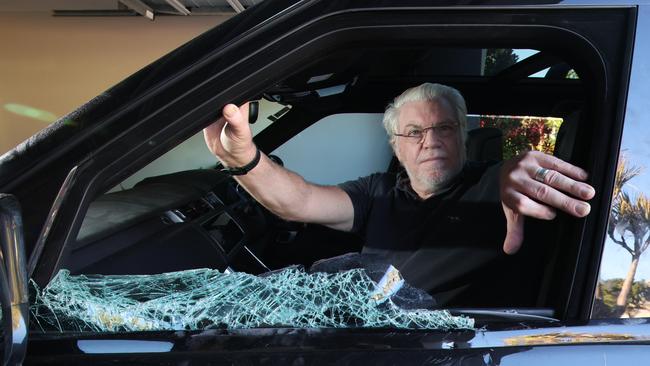
David says he was told that another high-end car at the shopping centre has also been targeted.
Neither was stolen. The thieves, it was believed, had been after the log books.
“Apparently they took off and they attacked another, what the police deemed as a high value car. In this case they were able to gain entry to the car and they stole the logbooks, among other things.
“The police told me they wanted an address, and log books give addresses.”
Police on the Gold Coast last year warned that log books were being targeted, saying some contained information that allowed offenders to create duplicate keys.
“Most people don’t realise the large amount of information that is contained in log/service books and that it can greatly assist an offender to steal a vehicle,” said Senior Sergeant Bruce Tracey from the Gold Coast District Crime Prevention Unit.
Although David’s log books were not in the car, and David can’t recall leaving anything else there that contained their address, the experience has left David and Elle on edge.
“I hear bumps in the night now and I go, is that somebody coming in?,” Elle says.
“Yes, we’re in a gated community, but it still doesn’t give you peace of mind.
“ … It makes me jump. I don’t know that they don’t have our address.”
CRIME – AND NO PUNISHMENT
In all their time in Sydney, David and Elle were never victims of crime.
Now they had been involved in two serious incidents on the Gold Coast twice in just three months.
They think they know why.
The driving behaviour they see in Queensland, they say, is unthinkable south of the border, where numerous police roam the roads.
As is the lack of deterrents for youth offenders.
“People have said to us, ‘are you sure you have made the right decision?’ We never had anything like this in Sydney at all,” David says.
“It’s not happening like this in Sydney. The stats came out the other day. Queensland has the highest crime rate per person in the whole of Australia.
“ … Sydney’s a lot more condensed, there’s a lot more pressure, and yet the crime rate is nowhere near what’s up here.
“(The problem is) there’s no discouragement. There’s no incentive to toe the line. If they can break the law, get arrested, get charged, be put back out with no conviction and no consequences, it’s not going to change their mind.”
The statistic David is referring to is those 289,657 people who were victims of crime in Queensland last year.
Victims just like David and Elle. The faces, and the stories, behind that number.
“I’ve now become a Queensland victim of crime statistic, big deal,” David says. “But that’s just a number on a ledger. There’s the impact the whole way through.”
Among the impacts: the fear of being targeted again, the disruption of having lost not one, but two cars, the impact on David’s 97-year-old father. “Your poor father is so stressed because he thinks it’s his fault now,” Elle says. “Because David had to take his father to an appointment, now he thinks it’s his fault.”
And the insurance costs, ultimately borne by everyone.
“This is the impact of the justice system not doing its job,” David says. “The police did a fantastic job, but one of the things that is alarming is, they are concerned about whether you are insured. I said ‘yes’, they said good, ring this number, get a QPS number, and let your insurance company deal with it.
“I said that’s all well and good, but I’m out of pocket now two grand for my excess. Everyone else pays because everything lifts.”
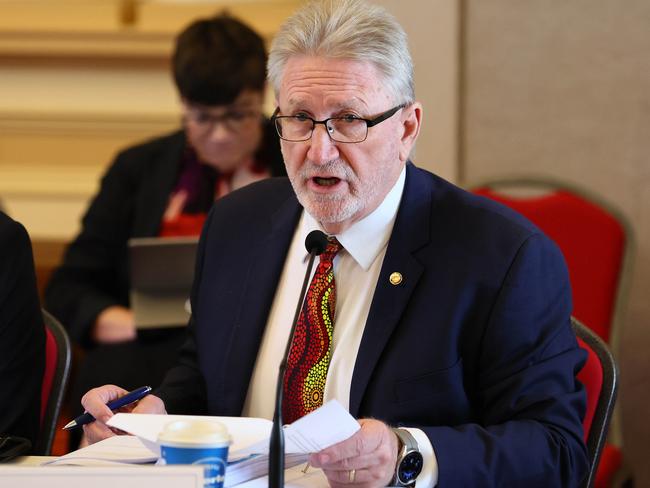
The couple’s local MP, Michael Crandon, says he has heard many similar stories in his Coomera electorate over the past 10 years. Too many.
“It’s ongoing,” he says. “I can think about more and more that I hear about.
“About people in fear. About whether or not they’re going to be a victim. And if they have been a victim, whether or not they’re going to be a victim again.
“We hear those stories all the time. A decade ago, this was not something that was high on anyone’s radar.
“I needed more police for the northern Gold Coast, absolutely, but we were not experiencing what we’re experiencing now.”
Mr Crandon pointed to revelations in parliament this week that police numbers in Queensland have only gone up by 303 in four years – from 12,038 to 12,341 – despite election promises of 1450 new officers.
He contrasts that with the population growth in his electorate. “In some years we’ve had growth of 10 and 12 per cent per annum in population.”
The biggest problem though? In Mr Crandon’s view, it’s a lack of consequences.
“(There’s a) lack of deterrents. There’s no doubt about it. These young people in particular know that they’re going to be slapped on the wrist. It’s as simple as that.
“We are determined to do something about it if we’re successful (in the state election) on the 26th of October.
“It’s not something that can be turned around in five minutes, but boy oh boy, it has to be turned around, that’s for sure.”
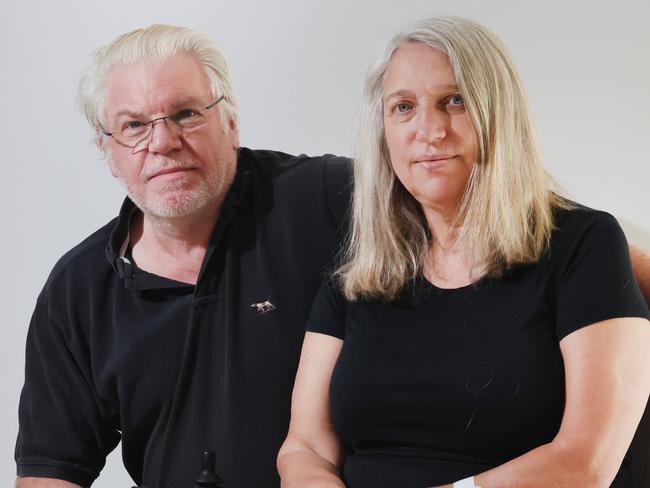
THE SAVING GRACE
Despite everything, David and Elle do not regret their decision to move to Queensland. They won’t be going back to Sydney.
And it’s not just that they refuse to be scared away.
“We love it here. We were having a great time (before the incidents),” Elle says. “We’ve really embedded ourselves in the community, which has been wonderful.
“They’ve been wonderful to us. I can’t tell you, through the entire accident, the support and the care and the love – the outpouring has been overwhelming.”
David says it’s something they would not have encountered before they moved.
“I can say, with respect to our Sydney friends, we would not have got that support in Sydney.
“Had this occurred in Sydney, Sydney is just too manic, too busy.
“Up here, it’s a much gentler lifestyle – apart from the youth violence crisis.”
The crisis that has seen them become two more names, two more stories, hidden in an awful statistic.
More Coverage
Originally published as QLD crime crisis: One couple’s tale exposes the nightmare behind the statistics





